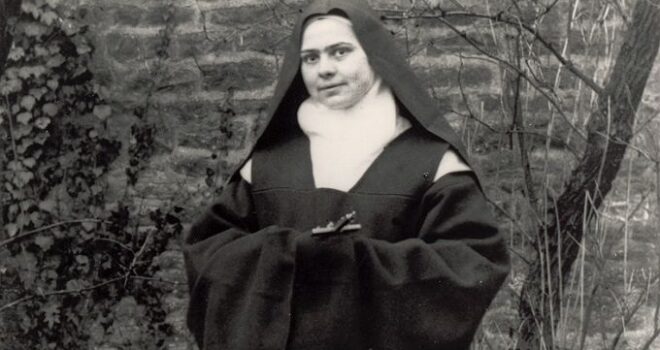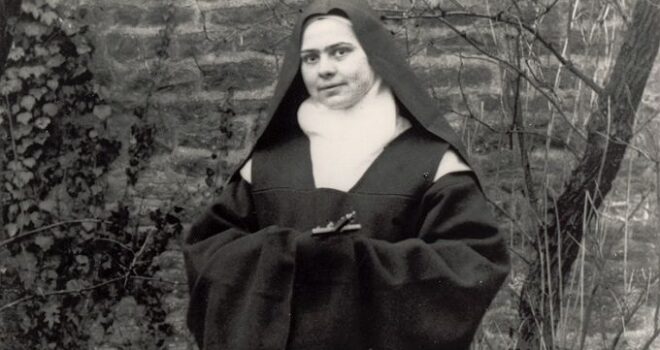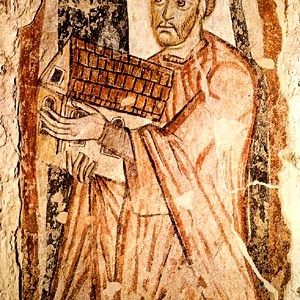Yesterday was the Memorial of St. Elizabeth of the Trinity. She was a Carmelite mystic whose writings penetrate the depths of God’s love for each one of us. In her letters to her beloved spiritual children, she encourages them and us on the path to union with God. Her spiritual motherly guidance serves each one of us as we seek to make our way to the heights of holiness we are called to. Her writings on how to overcome the deadly sin of pride are a joyful guide to growing in greater holiness and union with Christ Crucified.
One of the greatest difficulties all of us encounter on the path to holiness is how deeply enslaved we are to pride. We place ourselves at the center of everything. Our egos are tyrants who want to keep us enslaved, so that we cannot fly to union with God. The enemy uses pride at every turn to keep us from freedom, but the Lord wants to free us from the heavy, deadly weight of pride.
The process to putting pride to death is a long one. We cannot expect to put it to death in a single day. In Elizabeth of the Trinity Complete Works Volume 1: The Greatness of Our Vocation, St. Elizabeth of the Trinity writes:
“…the humble person finds his greatest pleasure in life in feeling his own “weakness” before God. Little Framboise, pride is not something that is destroyed with one good blow of the sword! Doubtless, certain heroic acts of humility, such as we read of in the lives of the saints, give it, if not a mortal blow, at least one that considerably weakens it; but without that grace we must put it to death each day! “Quotidie morrow,” exclaimed St. Paul, “I die daily!”
Combating pride in our daily lives is not typically found in one major win on the battlefield or even in one thorough and contrite Confession. The Sacraments provide great graces to us, so that we can engage in the daily battle against self. There are moments, by God’s grace, of great triumph over the pride within ourselves, but more often than not, we must die daily in order to put pride to death and grow in humility. We must learn to bite our tongue in the face of aggravation, put others before our own wants, and allow the humiliations the Lord puts in our path to help us grow. The battle with pride is a long game, which requires trust in the Lord.
The enemy wants us to be discouraged by our failures, but the Lord wants us to come to Him in our weaknesses, so He can be our strength. It is in this dying-to-self and the stripping away of our pride that we are set free. As Christians, we are called to die to our old way of life bound by pride. St. Elizabeth of the Trinity writes:
“…this doctrine of dying to self is the law of every Christian, for Christ said: “If anyone wants to follow Me, let him take up his cross and deny himself.” But this doctrine which seems so austere, takes on a delightful sweetness when we consider the outcome of this death—life in God in place of our life of sin and misery.”
The process of putting pride to death is painful in the beginning. It may even seem burdensome as we see how much we are enslaved by this deadly sin, but St. Elizabeth of the Trinity reminds us to raise our eyes to the God who loves us and who wants to free us. The Lord truly desires to give us freedom that can only be found in Him. If we keep His gaze constantly before us, then we can, with His graces, put to death the old man and woman of pride.
This death-of-self leads us to an awareness of who we are called to become. St. Elizabeth of the Trinity points out that a holy soul is aware of the greatness they are called to. This is not false pride, rather, it is the truth revealed through the virtue of humility. We are called to far greater heights than we can imagine. The Lord wants to lead us to those great heights, but only the humble can ascend to Him. This freedom in God is found in forgetting one’s self and seeking only God. As St. Elizabeth of the Trinity explains:
“It seems to me the soul that is aware of its greatness enters into that “holy freedom of the children of God” of which the Apostle speaks, that is, it transcends all things, including self. The freest soul, I think, is the one most forgetful of self. If anyone were to ask me the secret of happiness, I would say it is to no longer think of self, to deny oneself always. That is a good way to kill pride: let it starve to death! You see, pride is love of ourselves; well, love of God must be so strong that it extinguishes all our self-love.”
The path of self-denial is ultimately a path of love and true greatness. Instead of being a life of drudgery and burden, denying ourselves leads us to freedom and happiness precisely because it leads us to love God above all things and to love others as He loves them. This is how we turn around the diabolical lie that we should be the center of all things. We conquer pride with love, which then reveals the greatness we are called to.
When we find ourselves falling into the sin of pride, which is inevitable as we grow in holiness and union with God, we are not supposed to fall into discouragement. Our weakness is to be expected. The Lord knows our weakness and He calls us to turn with loving confidence to Him:
“…you must not become discouraged, for again, it is pride which is irritated. You must “display your misery” like Magdalene at the Master’s feet, and ask Him to set you free. He so loves to see a soul recognize its weakness. Then, as a great saint said, “The abyss of God’s immensity encounters the abyss of the creatures’ nothingness,” and God embraces this nothingness.”
The Lord desires to enter into our weaknesses and nothingness. He wants to enter into the places where we fail to grow in humility in order to free us from pride. We cannot overcome the heavy sin of pride alone. He must raise us up with each new fall. We turn to Him knowing that His love and mercy will make up for all we lack and that He greatly desires to set us free.
Our ultimate freedom is found on the Cross. This willing battle with our prideful nature allows us to share in the Passion of Christ. Through our struggle and suffering we can unite ourselves to Christ Crucified. True happiness and freedom will be found in union with Christ on the Cross. St. Elizabeth of the Trinity joyfully states:
“It seems to me that the happy ones of this world are those who have enough contempt and forgetfulness of self to choose the Cross as their lot! What delightful peace we experience when we place our joy in suffering!”
The suffering we experience as we learn to die-to-self each day is an opportunity to enter in the joy and peace that can only be found through the Cross. As Our Lord bore the Cross and died a brutal, torturous death out of love for us, we can learn to die in our pride and sin through His love and the love He pours into our souls as they are freed from selfish pride.
The battle with pride is deeply difficult. We are weak and we will fail at times. It is painful to die-to-self and we have to be willing to suffer as Christ prunes away all that is dead within us. St. Elizabeth of the Trinity promises, however, that this is the path to freedom and joy. If we take our weaknesses to Christ and raise our eyes to heaven, He will make up for all that is lacking within us. He will fill us with His divine love and lead us to deeper union with Him as we continue to battle against our pride. Let us remember that the path to holiness is a path to Divine Love.
Image: St. Elizabeth of the Trinity, via CNA












